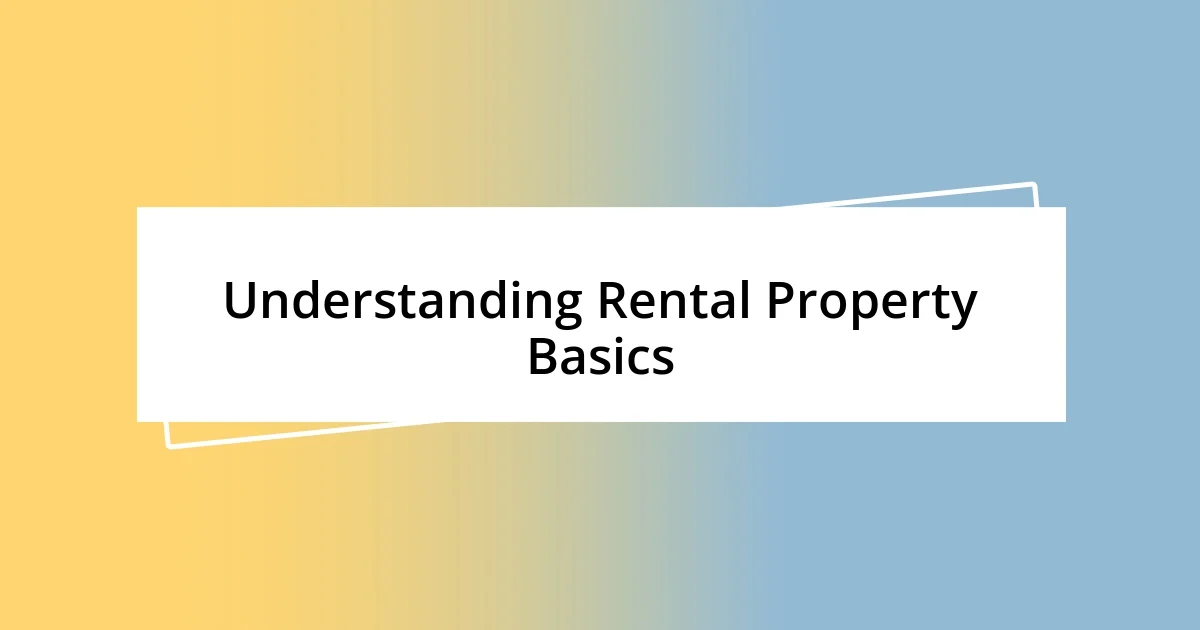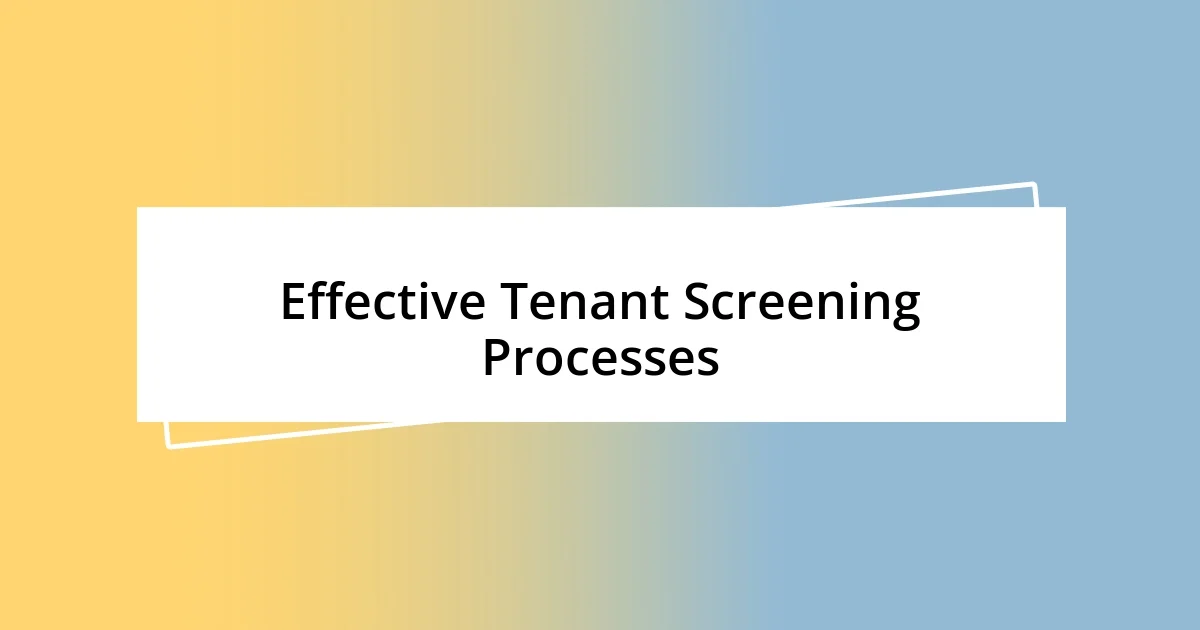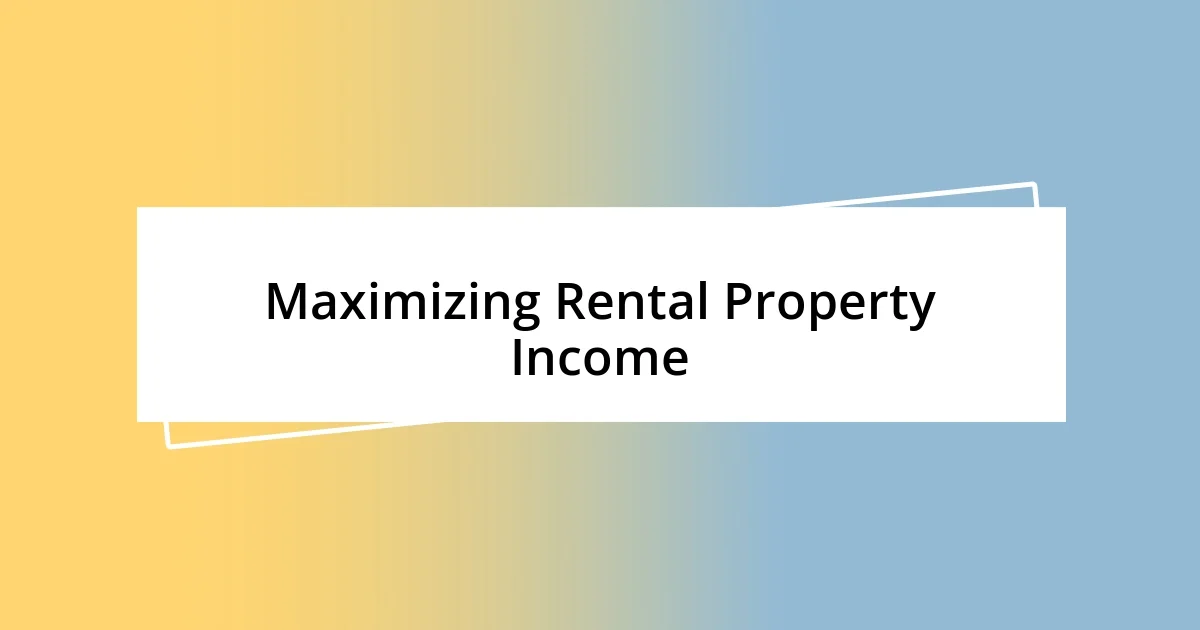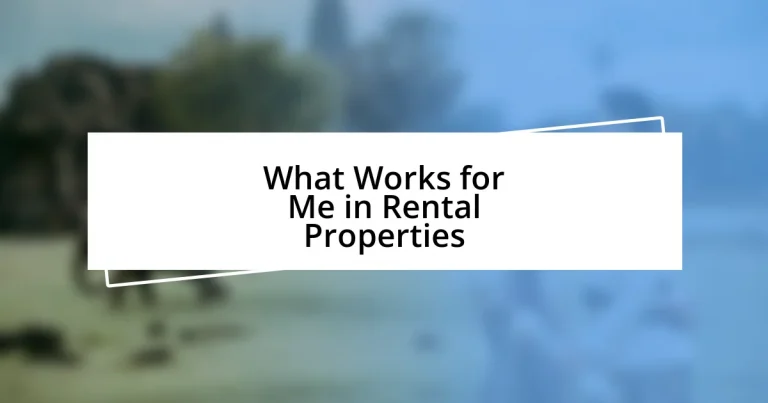Key takeaways not available due to an error.

Understanding Rental Property Basics
Understanding the fundamentals of rental properties is key to becoming a successful landlord. I remember the initial thrill I felt when I purchased my first rental property, but it quickly transformed into a sense of responsibility. Have you ever felt that heady mix of excitement and apprehension? It’s what truly sets the stage for your journey in this arena.
One of the first lessons I learned was the importance of location. I bought a property just a few blocks away from a growing urban center, thinking it would be a goldmine. While it did attract tenants, the neighborhood quirks surprised me—factors like local traffic and nearby amenities can make or break your investment. Isn’t it fascinating how something so seemingly simple can have such a profound impact?
Understanding basic financial metrics is another crucial area. When I first delved into rental properties, terms like cash flow and ROI (return on investment) felt daunting. But breaking them down into practical examples helped; for instance, I calculated my expenses and compared them against my rental income to gauge profitability. Have you considered how crucial these numbers are to your success? Remember, knowledge is power here, so take the time to familiarize yourself with your unique financial landscape.

Choosing the Right Location
When it comes to choosing the right location, I’ve learned that it’s not just about proximity to urban centers, although that can be a strong factor. I once invested in a property that appeared to be a great deal because it was close to a popular shopping district. However, I quickly discovered that lack of parking and high noise levels weren’t appealing to potential tenants. It’s those little details that matter. You might snag a property in a great spot, but if it has flaws that deter renters, you’ll end up with a vacant unit.
Here are some key elements I now consider when evaluating a location:
– Safety: Low crime rates make an area more attractive to tenants.
– Accessibility: Proximity to public transportation can be a game-changer.
– Amenities: Restaurants, parks, and schools create a desirable community vibe.
– Future Development: Look for areas with planned developments or renovations; they can increase property value.
– Local Market Trends: Staying updated on economic shifts is essential for making informed decisions.
Understanding these aspects can redefine your investment strategy, shifting it from guesswork to a more deliberate approach.

Effective Tenant Screening Processes
Effective tenant screening is one of the most crucial steps in managing rental properties. I’ll never forget the first time I met a prospective tenant who seemed great on paper but turned out to be a nightmare once they moved in. This experience taught me the importance of digging deeper into background checks, credit history, and rental references. Have you ever felt that dread when realizing you overlooked something significant? Taking the time to thoroughly vet applicants can save a world of hassle in the long run.
In my experience, I’ve found that establishing a systematic process leads to better outcomes. I like to start with a rental application that clearly outlines the screening criteria. This not only speeds up the evaluation process but also sets expectations for potential tenants. The more transparent I am, the less room there is for misunderstandings later. Think about your own experiences—has clarity ever helped you in a challenging situation? I can say with certainty that it goes a long way in fostering a positive landlord-tenant relationship.
Furthermore, incorporating technology into the screening process has made my life infinitely easier. With online tenant screening services, I can quickly access comprehensive reports that would have taken hours to gather manually. This doesn’t just save time; it also helps me feel confident in my decisions. How have you integrated technology into your real estate practices? For me, it’s about striking the right balance between efficiency and thoroughness.
| Screening Step | Description |
|---|---|
| Application Form | Collect essential information about the applicant’s background and employment. |
| Credit Check | Review their credit history to assess financial responsibility. |
| Background Check | Look into criminal history to ensure safety for all tenants. |
| Rental History | Contact former landlords to gauge behavior and payment history. |
| Income Verification | Check for sufficient income to cover rent, typically asking for a salary slip or bank statement. |

Maximizing Rental Property Income
Maximizing rental property income often starts with strategic pricing. I remember when I hesitated to raise rents after a long-term tenant moved out, fearing it would scare off potential renters. But, after analyzing comparable properties in the area, I realized I was undervaluing my unit. Setting a competitive yet fair rent can not only attract quality tenants but also ensure that I optimize my income. Have you ever second-guessed your pricing strategy? Sometimes, it takes a bit of research to confirm your instincts.
Another key factor is enhancing the property’s appeal. I once invested in simple upgrades, like fresh paint and modern fixtures, which significantly increased interest in my listing. I never expected that a relatively small investment would yield such high returns. In my experience, focusing on curb appeal and interior updates can justify higher rents and attract the right tenants. It’s about making tenants envision themselves living in the space—what small change could you make to enhance your properties today?
Lastly, I’ve found that offering flexible lease terms attracts a broader range of tenants. Early in my journey, I missed opportunities by sticking strictly to the traditional 12-month lease. When I decided to introduce shorter leases and consider furnished options, I noticed a significant uptick in interest. Have you ever thought about the advantages of flexibility? It not only improved my occupancy rates but also opened the doors to a diverse tenant pool, boosting my overall income potential.

Essential Property Management Tips
When it comes to property management, proactive maintenance stands out as a game-changer. I’ve learned this the hard way—I remember a time when a small leak in a bathroom escalated into a major plumbing issue because I didn’t address it promptly. By scheduling regular inspections and being attentive to tenant feedback, I can catch potential problems before they spiral out of control. How often do you check in on your properties? I’ve found that even a quick visit can foster goodwill and ensure everything is running smoothly.
Communication with tenants also plays a pivotal role in effective property management. There was an instance when I neglected to keep an open line during a noisy neighbor situation. I quickly learned that being approachable made tenants feel more valued and empowered to voice their concerns. Establishing clear communication channels, whether through phone calls or dedicated emails, can help build trust and promptly resolve issues. Have you ever had a tenant surprise you with a brilliant suggestion, maybe because they felt comfortable reaching out? I’ve found it’s those interactions that strengthen relationships and ultimately lead to longer tenancies.
Lastly, implementing a solid record-keeping system has been essential for my success. In my early days, I often scrambled to find important documents, which created unnecessary stress. By organizing everything—from leases to maintenance records—I’ve made life easier not just for myself, but also for my tenants. I use both digital tools and physical files to stay on top of things. What systems do you currently have in place? I’d argue that a little organization goes a long way in preventing issues and ensuring that everything runs like a well-oiled machine.

Maintaining Long-Term Tenant Relationships
Maintaining positive relationships with tenants is a cornerstone of my rental property strategy. I once had a tenant who was having a tough time due to personal issues; instead of merely enforcing the lease terms, I chose to sit down and listen. That conversation transformed our relationship—she felt respected and valued, and she ended up renewing her lease year after year. Have you ever taken the time to really understand your tenants’ perspectives? It can lead to loyalty that benefits both parties.
Regular check-ins have also proven invaluable to me. I remember a time when a tenant casually mentioned that a heater was making strange noises; this prompted me to schedule a quick maintenance visit. Not only did I resolve the issue before it became a problem, but the tenant appreciated my attentiveness, and it reflected well on my property management style. Simple gestures go a long way, don’t they? Just asking how things are can solidify a sense of community and encourage tenants to reach out when they need help.
Lastly, I’ve discovered that celebrating milestones—like lease anniversaries—creates a warm environment that tenants appreciate. Once, I surprised a tenant with a small gift on their one-year anniversary in the unit, and it sparked a lovely thank-you note. That little act of kindness helped cultivate a friendly bond, making them more likely to treat the property with care and renew their lease. What small gestures do you think could make a big impact with your tenants? Sometimes, a little appreciation can turn a simple rental agreement into a long-term partnership.














